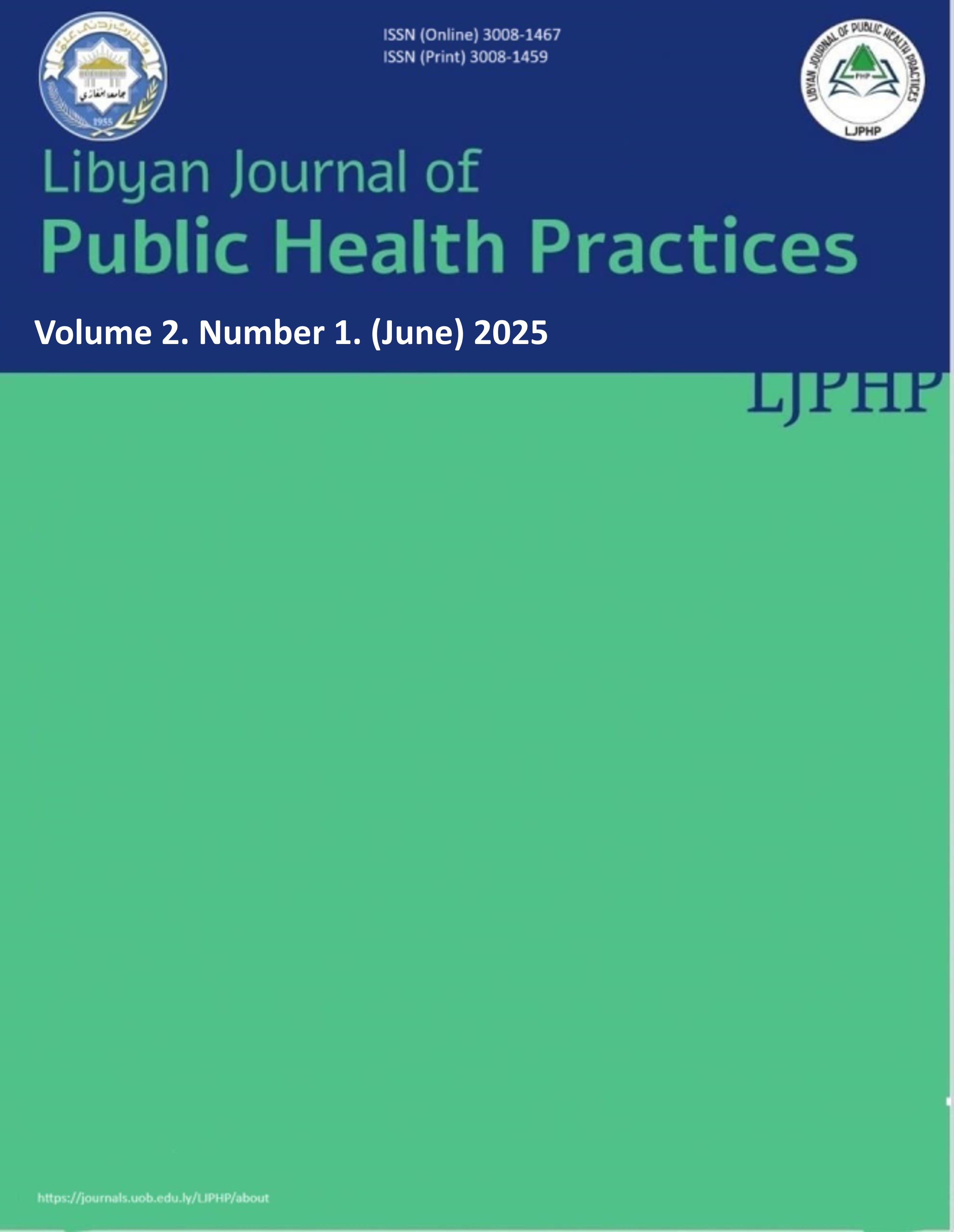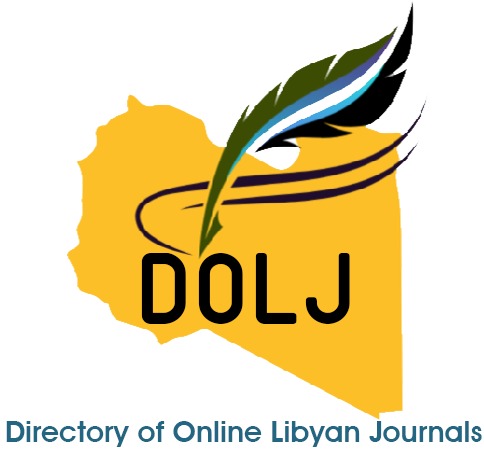Food Insecurity and Hunger among Internally Displaced Families in Benghazi, Libya
DOI:
https://doi.org/10.37376/ljphp.v2i1.7339Keywords:
Food Security, Conflict, Internal Displacement, Benghazi, Libya, COVID-19.Abstract
Food security (FS) is a critical issue exacerbated by conflict and pandemics. This study investigated FS among internally displaced persons (IDPs) in Benghazi, Libya, during the COVID-19 pandemic. A cross-sectional survey was conducted with 120 IDP families residing in three camps in Benghazi, Libya. The Radimer/Cornell Hunger Scale was used to assess household FS. The findings revealed a high prevalence of food insecurity, with 91.7% of families experiencing some level of food insecurity. Factors such as parental education, paternal employment, and access to food storage and preparation equipment significantly influenced FS levels. The study highlighted disparities in FS between camps, with El-Helis camp showing higher levels of food insecurity. The complex interplay of conflict and pandemic-related disruptions to food systems, employment, and financial stability contributed to these challenges. This research emphasizes the urgent need for targeted interventions to address food insecurity among IDPs in conflict-affected regions. Such interventions should include immediate food assistance, improved distribution systems, and long-term strategies for building self-sufficiency and enhancing access to food resources
References
World Food Summit. The Rome Declaration on World Food Security. Popul Dev Rev 1996; 22: 807–809.
FAO. An Introduction to the Basic Concepts of Food Security, www.foodsec.org (2008, accessed 17 February 2022).
Devereux S. The impact of droughts and floods on food security and policy options to alleviate negative effects. 2007.
Israel D, Briones R. Impacts of Natural Disasters on Agriculture, Food Security, and Natural Resources and Environment in the Philippines, https://www.econstor.eu/handle/10419/126912 (2012, accessed 17 February 2022).
Teodosijević SB. Armed Conflicts and Food Security, www.fao.org/es/esawww.fao.org/es/esa (2003, accessed 17 November 2021).
FAO, IFAD, UNICEF, et al. In Brief to The State of Food Security and Nutrition in the World 2020. FAO, WHO, IFAD, WFP, UNICEF, 2020. Epub ahead of print April 2020. DOI: 10.4060/ca9699en.
Kakaei H, Nourmoradi H, Bakhtiyari S, et al. Effect of COVID-19 on food security, hunger, and food crisis. COVID-19 and the Sustainable Development Goals 2022; 3–29.
FAO, IFAD, UNICEF, et al. The State of Food Security and Nutrition in the World 2021. FAO, IFAD, UNICEF, WFP and WHO. Epub ahead of print 12 July 2021. DOI: 10.4060/cb4474en.
World Food Programme. UN report warns of accelerating food insecurity in the Arab region due to global crises, https://www.wfp.org/news/un-report-warns-accelerating-food-insecurity-arab-region-due-global-crises (2023, accessed 7 May 2025).
Kabbani N. Survey Results on Hunger and Food Insecurity in Yemen, http://www.luc.edu/orgs/meea/ (2005).
Palestine | World Food Programme, https://www.wfp.org/countries/palestine (accessed 7 May 2025).
Fao. Syrian Arab Republic - FAO in the 2021 humanitarian appeals.
Food insecurity deepens in Lebanon following conflict, new report shows | World Food Programme, https://www.wfp.org/news/food-insecurity-deepens-lebanon-following-conflict-new-report-shows (accessed 7 May 2025).
Messer E, Cohen MJ. Conflict, Food Insecurity and Globalization. Food Cult Soc 2007; 10: 297–315.
FSIN, Global Network Against Food Crises. Global Report on Food Crises. Rome, 2021.
Jesenský M. Libya: What Went Wrong in 2011? In: The United Nations under Ban Ki-moon: Give Diplomacy a Chance. Cham: Springer International Publishing, pp. 103–117.
OCHA. LIBYA December Humanitarian Bulletin 2020: A Year in Review. 2020.
reliefweb. Libyan crisis threatens food security, https://reliefweb.int/report/libya/libyan-crisis-threatens-food-security (2011, accessed 13 April 2024).
ACTED. Multi-sector Needs Assessment in Selected IDP: Camps and Informal Settlements, Benghazi Libya. 2018. Epub ahead of print 2018. DOI: 10.6%.
Maurer P. Impact of COVID-19 on Vulnerable Populations (IDPs, Refugees, Migrants).
Hensen B, Mackworth-Young CRS, Simwinga M, et al. Remote data collection for public health research in a COVID-19 era: ethical implications, challenges and opportunities. Health Policy Plan 2021; 36: 360–368.
Kendall A, Olson CM, Frongillo EA. Validation of the Radimer/Cornell measures of hunger and food insecurity. J Nutr 1995; 125: 2793–2801.
Henjum S, Morseth MS, Arnold CD, et al. ‘I worry if I will have food tomorrow’: A study on food insecurity among asylum seekers living in Norway. BMC Public Health 2019; 19: 1–8.
Pai S, Bahadur K. The Impact of Food Insecurity on Child Health. Pediatr Clin North Am 2020; 67: 387–396.
Akbar M, Niaz R, Amjad M. Determinants of households’ food insecurity with severity dimensions in Pakistan: Varying estimates using partial proportional odds model. Health Soc Care Community 2020; 28: 1698–1709.
Curran M, Hartley RP. Discussion Paper Series Food security and policy effects by family size: How does quality of well-being depend on quantity of children, http://ukcpr.org/research. (2021).
Crepinsek MK, Burstein NR. Maternal Employment and Children’s Nutrition Volume I, Diet Quality and the Role of the CACFP. 2004; 7–20.
Büyüksoy GDB, Çatlker A, Özdil K. Food Insecurity and Affecting Factors in Households With Children During the COVID-19 Pandemic: A Cross-Sectional Study. Disaster Med Public Health Prep 2022; 16: 2528–2533.
Rahman A, Maio M Di. The Private Sector amid Conflict The Case of Libya. 2020.
Oakley AR, Nikolaus CJ, Ellison B, et al. Food insecurity and food preparation equipment in US households: exploratory results from a cross-sectional questionnaire. Journal of Human Nutrition and Dietetics 2019; 32: 143–151.
The Peaceful Change initiative. CONFLICT SENSITIVITY MANUAL FOR LIBYA, https://www.peacefulchange.org/resources (June 2022).
HLPE. REDUCING INEQUALITIES FOR FOOD SECURITY AND NUTRITION. Rome, www.fao.org/cfs/cfs-hlpe (2023).
Downloads
Published
How to Cite
Issue
Section
License
Copyright (c) 2025 Libyan Journal of Public Health Practices

This work is licensed under a Creative Commons Attribution-NonCommercial-NoDerivatives 4.0 International License.












